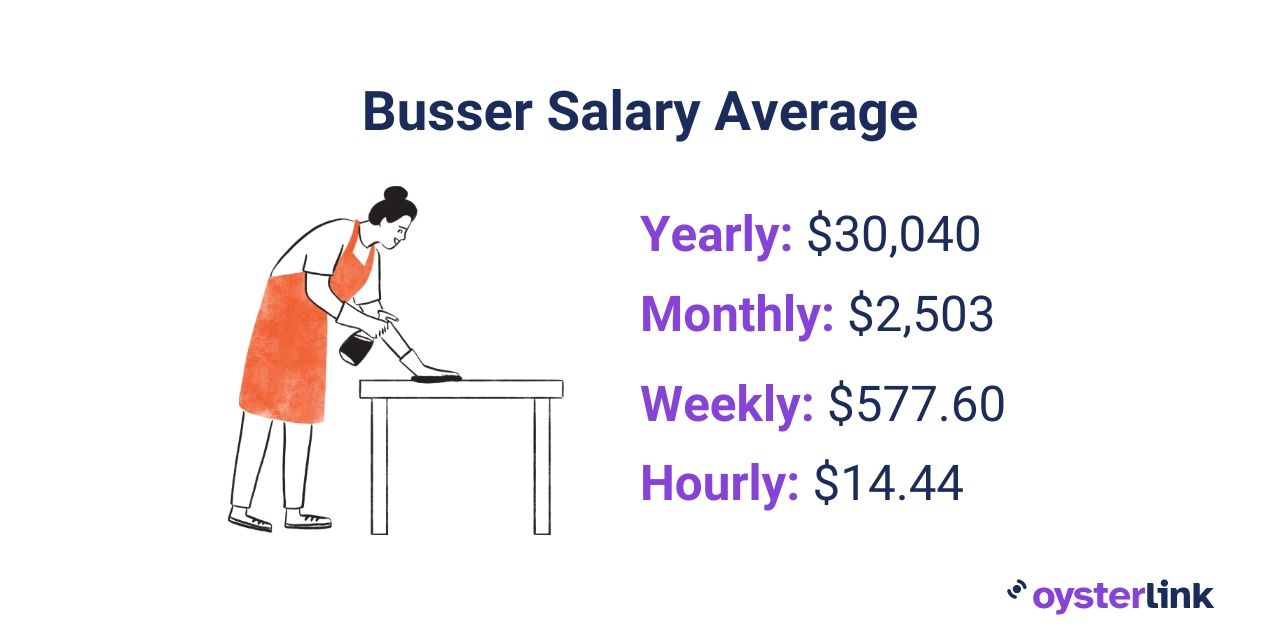Busser Salary in the United States
How Much Does a Busser Make in the United States?
The average Busser salary* is $2,503 a month or $30,040 per year. Discover ideas for how to get a raise (e.g., negotiating your salary and learning about which hospitality workplaces typically pay Bussers higher) in this guide.
* According to the most recent data calculated via OysterLink's salary methodology
What Is the Weekly Wage for Bussers?
The average weekly pay for Bussers in the U.S. is $577.60.
How Much Do Bussers Make an Hour?
Bussers in the United States make an average wage of $14.44 per hour. They can choose to work full-time or part-time and usually have a flexible schedule.

Working more hours would definitely mean higher earnings per month, and bussing part-time is a good option for students or those who want to augment their income.
In addition to the base wages, Bussers can supplement their income through tips from tipping out policies. However, the amount will depend on the restaurant’s policies regarding tip distribution and local labor laws.
Know how much you earn by year, month, week and hour with our Salary to Hourly Calculator.
Average Busser Salary by State
A Busser's annual salary varies in different states and is affected by several factors, including the required minimum wage in the state, the cost of living and the types of establishments.
States with higher costs of living, like California and Massachusetts, will likely dictate higher salaries so the workers can earn decent wages that would meet their needs. Major destinations and touristy areas also need more skilled restaurant workers who demand higher rates.
Check out the table below to sort average salary by location from highest to lowest or vice versa.
Busser Salary in Major US Cities
Below are some major cities offering some of the highest Busser salary averages.
Busser Salaries by Years of Experience
Although it's an entry-level position, a Busser's salary tends to increase as they gain more experience.
There are no definitive ways to gauge how much increase you'll get per year, but according to Salary.com, the average hourly wage falls between $10 and $13 for those with two or less years of experience.
Bussers with more experience can command higher salaries, as expected. They might also easily move up to supervisory roles in the restaurant industry because they can be entrusted with more responsibilities beyond the basics.
Moreover, a seasoned Busser will likely understand the restaurant's workflow and can easily anticipate needs, reducing training time for new hires.
This reliability makes experienced Bussers more attractive to employers, resulting in getting higher base pay and opportunities for yearly raises.
How Much You Can Earn From Roles Related to Bussing
Labor Laws and Taxes for Bussers
As a Busser, you need to be aware of the minimum wage, overtime pay and leave and tipping policies in your state so you know you're getting a fair salary.
We've provided the guides below for the major states:
You can also view more labor laws across the country in our Labor Law library.
How Much Would a Busser Earn After Taxes?
The salary of a Busser after taxes will vary from state to state, but here are some terms you should know so you can calculate your net salary.
Gross Income: This is your full salary before taxes, which varies based on your experience, location and other factors.
Deductions: This is an amount you can subtract from your gross income before calculating your tax deductions. These may include student loan interest, health insurance premium or charitable contributions. These deductions can typically lower the taxes you have to pay.
Federal Income Tax: The amount deducted will depend on your tax filing status — which will determine your tax bracket. The lower your taxable income, the lower the tax percentage. You can learn more about federal income tax rates and brackets here.
State and Local Taxes: Finally, different states and localities have their own income taxes that will be deducted from your gross pay. So, to calculate your Busser's salary after tax, just follow these steps:
- Find out your gross income.
- Subtract the deductions from your gross income to get your taxable income.
- Deduct federal, state and local taxes.
- Get the final amount of your salary after tax.
Not sure about the taxes in your location? Don't worry, you can use our free Paycheck Calculator to easily calculate federal and local taxes in your state.
6 Salary Negotiation Tips for Bussers
Your skills, experience and confidence will increase your chances of negotiating a Busser salary that meets your needs and expectations. Here are some tips to follow during your job-hunting process to achieve your desired pay.
1. Know the Market Rate
Make sure to research the average Busser salary in your area or state based on your experience level before starting negotiations.
2. Check the Restaurant Type
Consider the type of establishment you're applying to or choose the one you want to work for. Upscale or fine dining restaurants would usually offer higher salaries than casual dining establishments.
3. Emphasize Your Skills and Experience in Your Resume
Employers would often check for experience and skills when scanning a candidate's resume.
That said, you should emphasize your bussing experience and any additional skills you have, like food running or prep cooking.
This will help you stand out from other applicants and increase your chances of getting higher pay once you get an offer.
4. Highlight the Value You Can Provide
This one is related to the point above. During your Busser interview, give more details on how the restaurant will benefit from your current expertise.
Also, express your eagerness to learn more when you join their team. This shows you're always keen on improving in your job.
5. Have a Positive Attitude During the Interview
Demonstrate a positive and enthusiastic demeanor, and try to create rapport with the employer or hiring manager during your interview.
This will show interpersonal skills and your ability to connect with people, which employers highly value in anyone working a front-of-house role.
6. Be Flexible When Negotiating but Prepare to Walk Away
When the interviewer asks for your preferred salary, politely but confidently express your desired rate based on your research and experience. However, be prepared to potentially compromise when the offer comes.
If you feel the offer is lower than expected, ask if the compensation package includes benefits like bonuses, flexible scheduling and paid time off. You can also ask whether the restaurant shares tips with the Bussers.
From there, assess how these benefits and tips will impact your overall earnings. Politely decline the job offer if you feel it falls significantly below your expectations.
While you're at it, if you're looking for a better Busser opportunity, check out our list if the best-paying Busser jobs in the U.S.
Beyond Pay: Perks & Benefits for Bussers
Bussing doesn't typically offer comprehensive benefits like health insurance or retirement plans since it's an entry-level role. The job is also mostly part-time focused with schedules varying depending on the restaurant's needs.
There's also a high turnover rate (given the first two reasons mentioned), making employers hesitant to invest in benefits for employees who might not stay long-term.
However, there are several other perks and benefits that can make bussing an attractive option. These include:
- Flexible hours and schedules
- Free or discounted meals
- Paid time off
- Free training programs
- Potential for career advancement
Highest-Paying Restaurants for Bussers in Miami and NYC
Looking for a Busser job in Miami and New York City? OysterLink has gathered the latest and best-paying restaurants in these areas, so you don't need to search anywhere else:
Busser Salary Methodology
OysterLink uses data from the Bureau of Labor Statistics and other trusted job search sites to provide up-to-date salary insights.
 | Expert Reviewer Milos Eric thoroughly evaluated this salary guide to ensure the accuracy and comprehensiveness of the analyses provided. The salary guide provides insights such as location-specific figures, industry trends and factors that influence compensation. As the Co-Founder and General Manager of OysterLink, Milos brings his extensive experience as an entrepreneur and business executive. Through the years, he has led and hired more than 500 employees for global companies like DesignRush and Digital Silk. Not to mention, he is recognized as a Top Voice for Leadership, Recruitment and Recruitment Management on LinkedIn. |